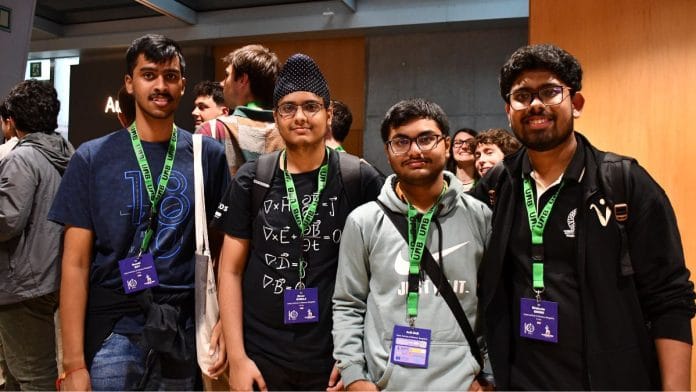Bengaluru: A team of undergraduate students from the Indian Institute of Science (IISc), Bengaluru, ranked sixth place in the 12th edition of Physics League Across Numerous Countries for Kick-ass Students (PLANCKS) 2025. This marks the highest ranking ever achieved by an Indian team.
The 4-hour closed-book examination, held in Barcelona, Spain, last month, is one of the most challenging theoretical physics competitions for undergraduates. Organised by the Royal Spanish Society of Physics, along with the International Association of Physics Students (IAPS), PLANCKS 2025 tested participants’ problem-solving skills, creativity, and depth in various domains of physics.
One of the questions asked was about the time of birth of the universe.
“They gave the field equations, densities of matter, (information on) dark matter, cosmological constant (and so on) then they asked a lot of questions like when did the universe start,” said Simar Narula one of the awardees this year, along with Ritabrata Ghosh, Susmit Roy, and Avik Das.
“Those questions were not questions that you might generally expect from a competitive exam in general. Those were concept-building questions,” said Ghosh. “The aptitude people have in IISc, and the kind of exposure we get in undergraduate programmes to some extent, developed us in such a way that we could solve those problems fairly.”
Last year, too, a team of IISc students went to PLANCKS and secured the seventh rank. Ghosh and the team were inspired by their seniors, and decided to sit for the national preliminaries.
The first three prizes were announced right after the competition on 5 May, and the remaining prizes on 6 May.
The team, which was initially skeptical about its performance, waited anxiously, eyes fixed on the Discord app screen. Once the result was out, they shared the joy with their classmates and professors. “All of them were proud about this and they encouraged us to do more things like this,” Narula said.
Also read: IMD makes leap with Made-in-India Bharat Forecast System, promises more accurate predictions
Not just an exam
To compete in the main event, IISc’s four-member undergraduate team—called the Denormalisation Group—nabbed top spot in the Indian Young Physicist’s League, the national qualifying round for the event.
Since 2014, following the inaugural edition in Utrecht, PLANCKS has been an event for physics students worldwide to compete, connect, and, most importantly, share their passion for physics. This year, approximately 200 students from 29 countries participated in the event, with a team of physics students from the United Kingdom taking first place. Beyond an academic challenge, PLANKCS 2025 was a celebration of physics, innovation, and international collaboration. This year, the event started with a lecture by the 2023 Nobel Laureate in Physics Anne L’ L’Huillier.
Apart from these lectures, entrepreneurial insights and institute visits in Barcelona, PLANCKS also serves as an opportunity to explore a different culture.
“During the event, the organisers gave us a short tour (of the city) and (they) let us see historic places like the Cathedral of Barcelona. After the event we also roamed by ourselves to see Montjuïc hill,” said Narula, especially thrilled to have seen the current home stadium of FC Barcelona.
The success of the Denormalisation Group at PLANCKS 2025 is also encouraging for passionate physics students across India. While Ghosh looks forward to PLANCKS 2026, he is aware of the unpredictability in the questions. “You have to work it (questions) out from scratch, and it’s more about experience and (how) you handle your composure at that time to work that out in those 4 hours,” he said.
The team’s journey to PLANCKS 2025 was funded by the Office of Development and Alumni. Affairs (ODAA), according to IISc news.
(Edited by Zinnia Ray Chaudhuri)






